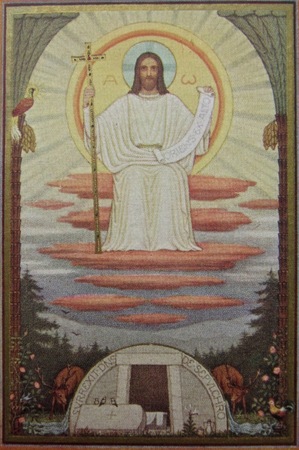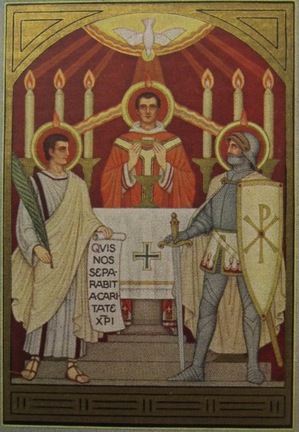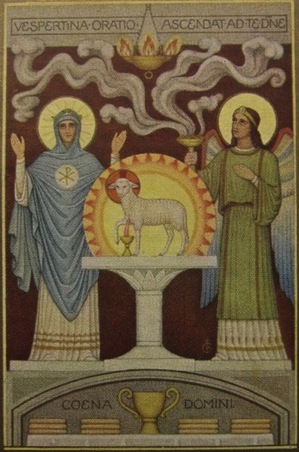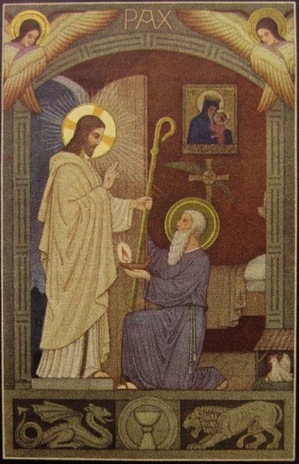At All Times and in All Places: Praise (XVI)
CHAPTER XVI. How the Work of God is to Be Done in the Daytime
19 Feb. 20 June. 20 Oct.
As the prophet saith: “Seven times in the day have I given praise to Thee.” And  we shall observe this sacred number of seven if, at the times of Lauds, Prime, Tierce, Sext, None, Vespers and Compline, we fulfil the duties of our service. For it was of these hours of the day that he said: “Seven times in the day have I given praise to Thee”; just as the same prophet saith of the night watches: “At midnight I arose to give Thee praise.” At these times, therefore, let us sing the praises of our Creator for the judgments of His justice: that is, at Lauds, Prime, Tierce, Sext, None, Vespers and Compline; and at night let us arise to praise Him.
we shall observe this sacred number of seven if, at the times of Lauds, Prime, Tierce, Sext, None, Vespers and Compline, we fulfil the duties of our service. For it was of these hours of the day that he said: “Seven times in the day have I given praise to Thee”; just as the same prophet saith of the night watches: “At midnight I arose to give Thee praise.” At these times, therefore, let us sing the praises of our Creator for the judgments of His justice: that is, at Lauds, Prime, Tierce, Sext, None, Vespers and Compline; and at night let us arise to praise Him.
Seven Times Daily
For Christians, nourished and illumined by the Word of God, the number seven signifies completion, fulness, and perfection. Saint Benedict’s seven day Hours (or services) mean, in effect, that the whole day is steeped in the adoration of God and full of His praises. The perfection of each day lies in its total consecration to the glory of God.
The Rhythm of a Ceaseless Prayer
The seven Hours of Lauds, Prime, Tierce, Sext, None, Vespers, and Compline mark the rhythm of an unbroken praise and a ceaseless adoration like that of the Angels in heaven. A monk is called to pray, not only when he occupies his choir stall in church, but in every place, and at every moment. Is this not the teaching of the Church expressed in the Preface of the Mass? “It is truly worthy and just, right and profitable unto salvation, that we should at all times and in all places give thanks unto Thee, O holy Lord, Father almighty, eternal God.”
Lauds: At Break of Day
Each of the day Hours has its own theological significance. Lauds is suffused with the radiance of the risen Christ. The Hour of Lauds celebrates the splendour of the resurrection with repeated references to the rising of the sun, the Dayspring that visits us from high (Luke 1:78); it summons the Church and all her members to a daily spiritual resurrection and to renewal in the grace of Holy Baptism:
Thou shalt sprinkle me with hyssop,
and I shall be cleansed:
thou shalt wash me,
and I shall be made whiter than snow.
To my hearing thou shalt give joy and gladness:
and the bones that have been humbled shall rejoice.
Turn away thy face from my sins,
and blot out all my iniquities.
Create a clean heart in me, O God:
and renew a right spirit within my bowels.
Cast me not away from thy face;
and take not thy Holy Spirit from me.
Restore unto me the joy of thy salvation,
and strengthen me with a perfect spirit. (Psalm 50:9-14)
The Benedicite
On Sundays, and in the festive Office, we sing the Benedicite, the canticle of the Three Young Men in the fiery furnace. The Benedicite convokes all of creation to a symphony of praise and thanksgiving. Nowhere is the doxological finality of all created things better expressed than in this magnificent offering of cosmic praise. As I have mentioned elsewhere, the Benedicite also constitutes the official liturgical thanksgiving of the priest after he has offered the Holy Sacrifice of the Mass.
The Laudate Psalms
The daily repetition of the Laudate psalms (148-149-150) was, until the reform of the Roman Breviary by Pope Saint Pius X in 1911, common to both the Roman and the Benedictine Offices. It is from these three psalms, chanted under a single Gloria Patri, that the Office of Lauds derives its name and its character of lavish and gratuitous praise. It is fitting that the very ancient and traditional daily use of these three psalms should remain alive among the children of Saint Benedict.
The Benedictus
The crown and summit of Lauds is the canticle uttered by Zacharias after the birth and naming of Saint John the Baptist: the Benedictus. In the chant of the Benedictus we pass from the shadows and pre-dawn glimmers of the Old Testament into the full brightness of the New. The Benedictus extols the grand work of redemption and recalls, at the beginning of each new day, the abiding mission of Saint the Baptist to go before the face of the Lord and prepare his ways.
Prime: The First Hour
The Hour of Prime is of monastic origin and is still celebrated in many monasteries today. Prime is a morning prayer, but unlike Lauds, which is ordered to the praise of the glory of God that shines on the face of the risen Christ, Prime is ordered to the sanctification and offering of the day’s labour.
Tierce: The Third Hour
The Hour of Tierce has long held my personal devotion. It is, as evidenced by its hymn, Nunc Sancte Nobis Spiritus, a daily renewal of the mystery and grace of Pentecost. Here is Blessed John Henry Cardinal Newman’s lovely translation of the hymn of Tierce:
Come, Holy Ghost, who ever One
Art with the Father and the Son;
Come, Holy Ghost, our souls possess
With thy full flood of holiness.In will and deed, by heart and tongue,
With all our powers, thy praise be sung;
And love light up our mortal frame,
Till others catch the living flame.Almighty Father, hear our cry
Through Jesus Christ our Lord most high,
Who with the Holy Ghost and thee
Doth live and reign eternally. Amen.
Tierce and the Holy Sacrifice
At the same time, according to tradition, the Hour of Tierce recalls the beginning of Our Lord’s blessed Passion; it was fitting, then, that very early in the development of the Church’s daily round of prayer, the third hour should come to be associated with the unbloody renewal of the Sacrifice of Christ in Holy Mass. Tierce now precedes the Holy Sacrifice of the Mass. Dame Aemiliana Löhr explains that, “while the faithful are praying Tierce, the oblata, –bread and chalice– are brought to the altar, and the priest vests himself for the celebration.” All this gives Tierce its very special character as a prelude to the Holy Sacrifice.
At the third hour Our Lord began His via crucis, His priestly ascent to the altar of the Cross. At the third hour His Body and Bride, the Church, received the anointing from on high, the outpouring of the Holy Ghost in a mighty wind and in tongues of fire, that filled with that Pentecostal grace, she might be made ready, through her priests, to take up take up the bread and the chalice, and so perpetuate the Sacrifice of the Cross until the end of time, “announcing the death of the Lord until He come” (1 Corinthians 11:26).
Sext: The Sixth Hour
Sext, the sixth hour, is the Hour at which Jesus stretched out His arms on the wood of the Cross; it is also the hour at which Jesus made known His thirst to the Samaritan woman at the well and revealed the Father’s desire for adorers in spirit and in truth.
He cometh therefore to a city of Samaria, which is called Sichar, near the land which Jacob gave to his son Joseph. Now Jacob’ s well was there. Jesus therefore being wearied with his journey, sat thus on the well. It was about the sixth hour. There cometh a woman of Samaria, to draw water. Jesus saith to her: Give me to drink. (John 4:5-7)
Finally, it was at the sixth hour that Saint Peter “”went up upon the house-top to pray” (Acts 10:9), and saw the vision revealing to him the admission of the Gentiles into the Church.
None: The Ninth Hour
None is the hour of Our Lord’s death upon the Cross, and of His descent into Hades. At the same time it is the hour of the healing of the lame man by the Apostles Peter and John.
Afterwards, Jesus knowing that all things were now accomplished, that the scripture might be fulfilled, said: I thirst. Now there was a vessel set there full of vinegar. And they, putting a sponge full of vinegar and hyssop, put it to his mouth. Jesus therefore, when he had taken the vinegar, said: It is consummated. And bowing his head, he gave up the ghost. (John 19:28-30)
Now Peter and John went up into the temple at the ninth hour of prayer. And a certain man who was lame from his mother’ s womb, was carried: whom they laid every day at the gate of the temple, which is called Beautiful, that he might ask alms of them that went into the temple. He, when he had seen Peter and John about to go into the temple, asked to receive an alms. [But Peter with John fastening his eyes upon him, said: Look upon us. But he looked earnestly upon them, hoping that he should receive something of them. But Peter said: Silver and gold I have none; but what I have, I give thee: In the name of Jesus Christ of Nazareth, arise, and walk. And taking him by the right hand, he lifted him up, and forthwith his feet and soles received strength. And he leaping up, stood, and walked, and went in with them into the temple, walking, and leaping, and praising God. And all the people saw him walking and praising God. And they knew him, that it was he who sat begging alms at the Beautiful gate of the temple: and they were filled with wonder and amazement at that which had happened to him. (Acts 3:1-10)
Vespers: At the Setting of the Sun
Vespers is the evening sacrifice (sacrificium vespertinum) of the Church. The Church offers the fragrant incense of her prayer to Christ, her Spouse; He takes it to His Heart, and unites it to His own prayer to the Father. “By Him therefore let us offer the sacrifice of praise always to God, that is to say, the fruit of lips confessing to his name.” (Hebrews 13:15). At Vespertide, the Church stands before the Father of Lights, with whom there is no change, nor shadow of alteration (James 1:17), thanking Him for the day’s best gifts, and perfect gifts, and for every grace received through the succession of hours.
A Eucharistic Hour
Vespers has a singularly Eucharistic quality. It is the hour of the Mystic Supper in the Cenacle when Jesus sat at table with His Apostles and pronounced the wondrous words of consecration over the bread and over the chalice, giving to His first priests the power of making present His sacrifice from the rising of the sun even to its setting. It is the hour when the disciples, having encountered Jesus on the road to Emmaus, said to Him, “Stay with us, because it is towards evening, and the day is now far spent” (Luke 24:29). It is the hour when He, granting their plea, went in with them.
And whilst he was at table with them, he took bread, and blessed, and brake, and gave to them. And their eyes were opened, and they knew him: and he vanished out of their sight. And they said one to the other: Was not our heart burning within us, whilst he spoke in this way, and opened to us the scriptures? (Luke 24:30-32).
Having come to the setting of the sun, the Church is full of gratitude that, even as darkness descends over the earth, she possesses within herself a Light that will never grow faint or give way to darkness: the adorable and life-giving mystery of the Most Holy Eucharist. The psalmody of Vespers soothes the troubled mind, and prepares both soul and body for the rest of the night.
The Magnificat
Just as the Benedictus is the crown and summit of Lauds, so too is the Magnificat the crown and summit of Vespers. The worthiness and dignity canticle of the Magnificat is unequalled, and this for three reasons: 1) because it issued forth from the most pure heart of the Blessed Virgin Mary, Mother of God; 2) because it celebrates the great things wrought by God, and glorifies His mercy that is from generation to generation; and 3) because it enshrines the humblest and highest sentiments that any human creature can express in the presence of God.
Compline: Before Sleep
Compline corresponds to Prime, and like Prime is of monastic origin. It consists of three psalms, a hymn, short lesson, versicle, collect, and blessing. Benedictine Compline does not include the canticle of Simeon, the Nunc Dimittis, although the Maurists, in their breviary, appended it to the psalms. Saint Benedict places Psalms 4, 90, and 133 at Compline. He makes a point of stipulating that it be chanted before nightfall. The psalms of Compline are invitation to compunction, to confidence in God, and to quietness. As a kind of postlude to Compline, we raise our voices in filial homage to the Blessed Virgin Mary, our heavenly Abbess and our Queen, trusting that, at the end of the day, she looks upon the weakest and neediest of her sons with eyes of mercy.

Once again Vultus Christi quenches the thirsty soul. Thank you. Blessings…